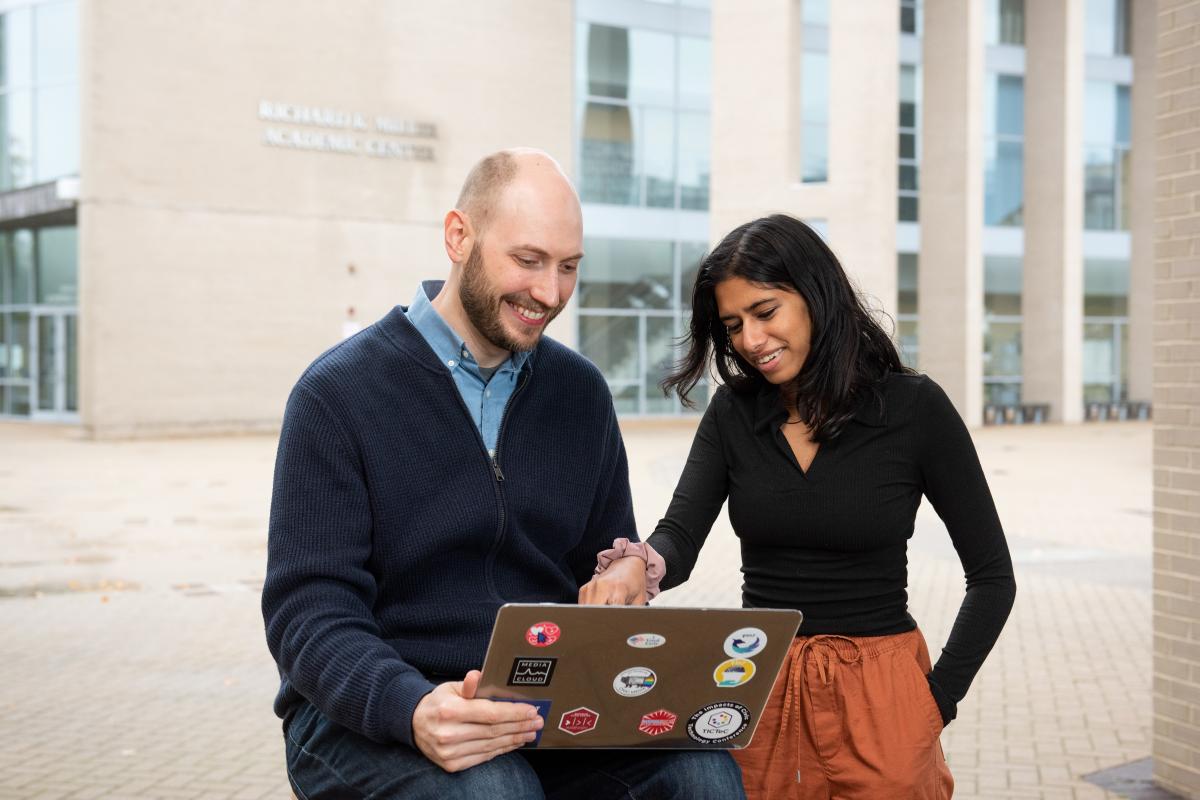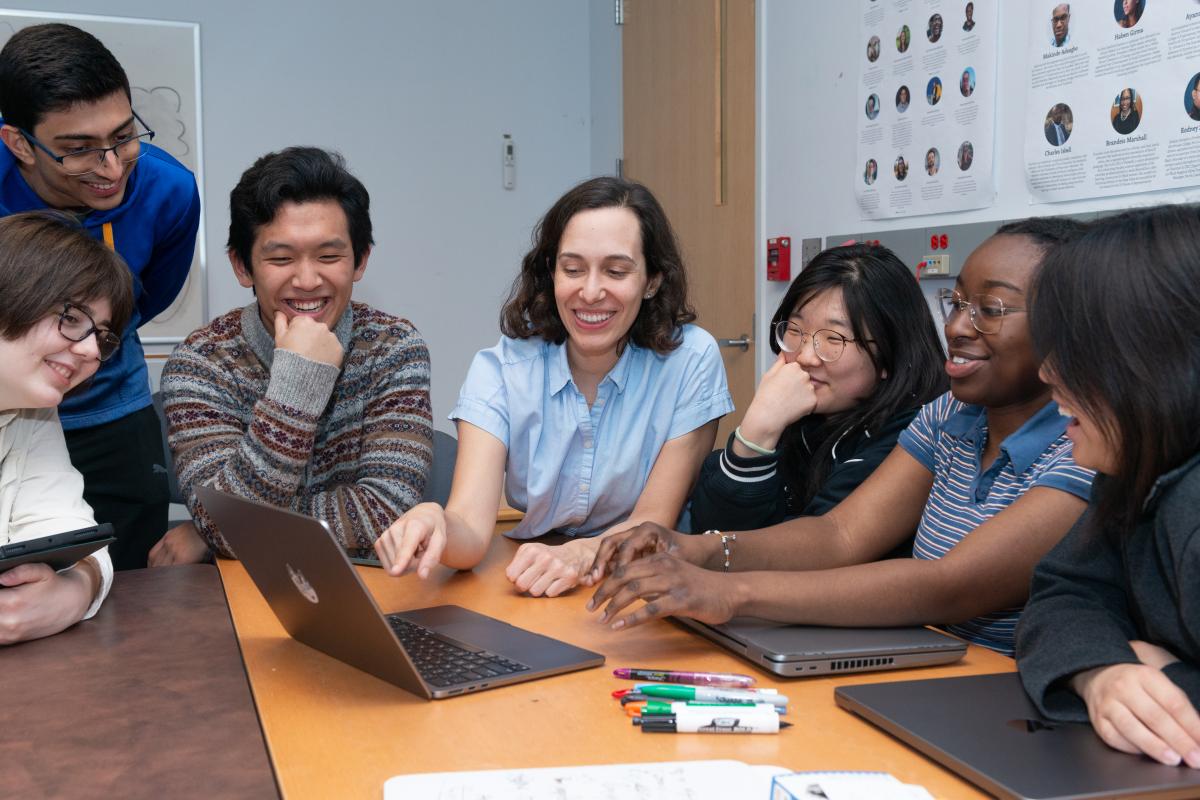NEWS: Olin College Awarded Grant from the Program for Leadership and Character at Wake Forest University
Erhardt Graeff, associate professor of social and computer science, and Andrea Cuadra ’13, assistant professor of computer science, have been awarded a $50,000 grant from the Educating Character Initiative (ECI), a part of the Program for Leadership and Character at Wake Forest University.
Olin is one of 40 grants awarded nationwide seeking to educate and embed character in their distinctive contexts of higher education.
The aim of Graeff and Cuadra’s project, titled Connecting Civic Virtue and Undergraduate Engineering, is to enhance Olin’s ability to integrate character and virtue education into its engineering curriculum, particularly through the lens of the technomoral virtues of Humility, Care, Courage and Civility, as Graeff proposes in his recent essay, “Civic Virtue among Engineers.”
By addressing curriculum integration, fostering faculty networks, encouraging individual commitment, advocating for institutional support, contributing to academic knowledge, planning for future funding, and leveraging existing institutional priorities, this project is designed to have a lasting impact on cultivating character among Olin’s undergraduate engineers.
“I’m grateful to Wake Forest’s Educating Character Initiative team for believing in Olin's mission as an innovator in engineering education,” said Graeff.
“For several years, Olin faculty have been exploring and experimenting with different approaches to teaching ethics, and I’ve had the privilege of helping lead some of those efforts. Virtue and character education have been used for millennia to guide humanity toward care and responsibility in their personal and professional lives," Graeff added.

PI Erhardt Graeff, Associate Professor of Social and Computer Science, is an active scholar and practitioner in civic learning within engineering education.
“I’m excited to explore all the potential connections between civic virtue and undergraduate engineering with my peers and create plans for integrating it into our curriculum,” said Cuadra. “My research has repeatedly demonstrated gaps between engineering-driven innovations and their potential to benefit society. These innovations often fall short of meeting the needs of groups who stand to highly benefit from them."
“I’m deeply motivated to explore how we might effectively embed humility, care, courage and civility in an engineering curriculum towards closing these gaps,” Cuadra added.
The mission of the Program for Leadership and Character at Wake Forest University is to inspire, educate and empower leaders of character to serve humanity. Through innovative teaching, creative programming and cutting-edge research, the program aims to transform the lives of students, foster an inclusive culture of leadership and character, and catalyze a broader public conversation that places character at the center of leadership.

Co-PI Andrea Cuadra ’13, Assistant Professor of Computer Science, works in human-computer interaction (HCI) at the intersection of interaction design, inclusion, and artificial intelligence.
PI Erhardt Graeff, Associate Professor of Social and Computer Science, is an active scholar and practitioner in civic learning within engineering education. He has demonstrated leadership in this area through his coordination of several prior efforts to help integrate civic learning, ethics, and values into Olin’s curricular and extracurricular offerings. He is alumnus of Notre Dame’s Integrating Virtue Together program, in which he was trained on how to implement character and virtue learning objectives and modules into his courses. Dr. Graeff has served as Olin’s inaugural liaison to the Public Interest Technology University Network since 2019 and is the co-founder and advisor of Olin’s student-led public interest technology clinic, PInT.
Co-PI Andrea Cuadra ’13, Assistant Professor of Computer Science, works in human-computer interaction (HCI) at the intersection of interaction design, inclusion, and artificial intelligence. Dr. Cuadra is particularly interested in exploring how we might design Olin’s curriculum towards further centering the “why” and “who” in engineering education. Her work advocates for integrating the needs of people who have been historically underrepresented in engineering and technology design, amplifying their benefits and mitigating potential harms. Recently, her worked showed how AI can make digital forms accessible to more people via natural language, and how design methods can be used to engage in community-based discussion about the positive and negative implications or implementation details of future ambient intelligence technologies.
Founded in 1997, Olin instills passion and ignites innovation in its students and prepares them to envision, create and deliver products, services, and systems that transform and improve people’s lives around the world. Olin teaches students to be explorers and creators who design their own path forward. By challenging norms and sharing its unique approach to education, Olin is revolutionizing the way engineers, and all undergraduates, learn and create knowledge. Located in Needham Massachusetts, Olin is ranked among the top-three undergraduate engineering programs in the country by U.S. News & World Report.